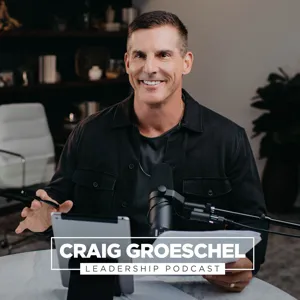Podcast Summary
Expand your options for effective decision making: Avoid either/or scenarios, consider multiple alternatives to make the best choice, and remember there are usually more possibilities than what's initially presented.
Effective decision-making is crucial for personal growth and successful leadership. Many people struggle with making quality decisions, often leading to regrettable choices or missed opportunities. To help you improve in this area, we'll dedicate the next two episodes of the Craig Groeschel Leadership Podcast to the art of strategic decision making. The first factor of great decision makers is to avoid either/or scenarios whenever possible. Instead, expand your options and consider multiple alternatives to make the best choice. Remember, there are usually more possibilities than what's initially presented. By focusing on developing your decision-making skills, you'll increase your ability to make positive, long-lasting impacts in your life and leadership. Stay tuned for more insights on this essential topic.
Expand options and consider multiple solutions: Avoid 'either or' decisions and consider multiple options to maximize potential, utilize resources effectively, and progress towards goals.
Instead of focusing on "either or" decisions, we should expand our options and consider multiple solutions. This approach can lead to maximizing the potential of current team members, utilizing resources more effectively, and avoiding the negative effects of procrastination. By avoiding "either or" scenarios and deciding when to decide, we can make better, more informed decisions and ultimately progress towards our goals. Remember, no decision is a decision, so it's important to actively and intentionally make decisions rather than passively delaying them.
Prioritize and schedule decision-making: Effective leaders create a to-decide list and schedule decision-making sessions to clear their minds, reduce stress, and make more effective decisions.
Effective leaders prioritize decision-making by creating a dedicated list and scheduling decision-making time. Instead of keeping decisions in our heads, which can lead to mental clutter and sleepless nights, recording decisions on a to-decide list allows us to free up mental capacity. By scheduling decision-making sessions, we can create decision momentum, making one decision easier to follow with the next. Additionally, setting artificial deadlines can help us commit to making decisions in a timely manner, even if the actual deadline is further in the future. Overall, by prioritizing and scheduling decision-making, we can clear our minds, reduce stress, and make more effective decisions.
Improve Decision Making in High-Impact Organizations: Be decisive and objective, consider bulk decisions, decide when to decide, act as your own advisor, and ask what a great leader would do for efficient decision making in high-impact organizations.
Making decisions efficiently is crucial for progress and growth, especially in high-impact organizations. Slow decision-makers hinder progress. To improve decision-making, consider bulk decisions, deciding when to decide, and acting as your own personal advisor. This strategy helps separate emotions from the situation and provides clarity. Additionally, asking yourself what a great leader would do can offer valuable perspective. Avoiding either-or scenarios, deciding when to decide, and acting as your own advisor are effective strategies to make decisions quickly and confidently. Delaying decisions until you're 100% sure may result in missing opportunities. By being decisive and objective, you can make the best choices for yourself and your organization.
Delegating Decisions and Embracing Mistakes: Effective leaders delegate decisions to develop future leaders, free up time, and embrace mistakes as a natural part of growth. To delegate successfully, trust team members, communicate clearly, and provide guidance when necessary.
Effective leaders understand the importance of delegating decisions and increasing their tolerance for mistakes. By delegating decisions, leaders develop future leaders and free up time to focus on larger organizational goals. However, this comes with the risk of mistakes. Instead of avoiding mistakes, leaders should embrace the risk-taking culture and understand that mistakes are a natural part of growth. To delegate decisions successfully, leaders must trust their team members, communicate clearly, and provide guidance when necessary. Additionally, leaders should ask themselves what their successor would do in their place to gain perspective and clarity in decision-making. By delegating decisions and increasing tolerance for mistakes, leaders can focus on leading a large organization and making a significant impact.
Empowering team members to make decisions: Effective leaders delegate decisions to develop future leaders, trusting their team to learn and grow while still maintaining ultimate responsibility.
Effective leaders understand the importance of delegating decisions to develop future leaders and empower their team, rather than overestimating the risks of making a wrong choice and underestimating the cost of indecision. Delegating decisions, not just tasks, is a powerful tool for leadership development, as it gives individuals authority and the opportunity to learn and grow. While it's natural for leaders to want to make all the decisions themselves, especially in the early stages of building an organization, the goal should be to do less and empower more as the team grows. Trusting your team to make decisions, even when they may not be perfect, is a necessary part of the growth process. Remember, you're still the ultimate decision-maker and the responsibility ultimately rests with you, but delegating authority is a crucial step in developing future leaders and building a strong, empowered team.
Leadership: Delegating Decisions and Fostering Success: As a leader, delegate decisions but maintain accountability, help those you trust succeed, and understand your decision-making style to improve leadership effectiveness.
As a leader, you can delegate decision-making authority but ultimately hold the responsibility for the outcomes. It's essential to help those you trust succeed, as the quality of leadership significantly impacts your organization. Additionally, there are various decision-making styles, and understanding yours can help you leverage strengths and manage weaknesses. In the coming month, we'll explore these styles further and provide strategies to enhance your decision-making skills. Remember, investing in your leadership development benefits everyone. Stay tuned for more insights and invite others to join our leadership community.






